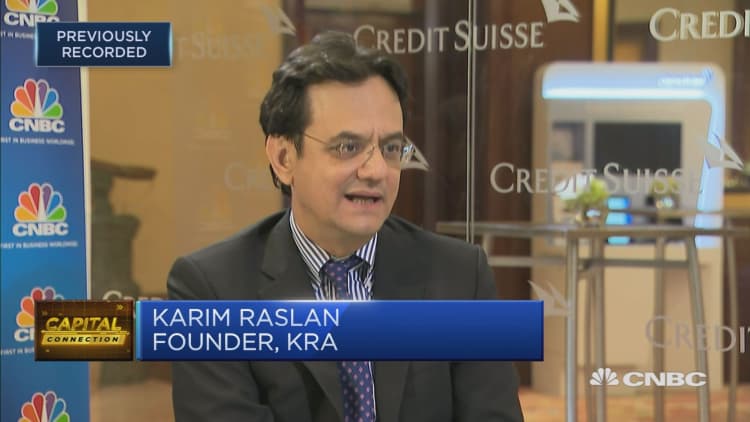“We are being duped, and we have to negotiate better for our own interests,” said Karim Raslan, the founder of ASEAN-focused political risk consultancy firm KRA Group about China’s Belt and Road Initiative.
By Shirley Tay

Countries should not be “duped” into borrowing from China through the Belt and Road Initiative, and should be looking for opportunities in India instead, says one firm critic of Beijing’s flagship infrastructure project.
”The BRI is all about Chinese strategic objectives; it’s not about the host countries,” said Karim Raslan, founder of political risk consultancy, KRA Group.
“We are being duped, and we have to negotiate better for our own interests,” he told CNBC’s Nancy Hungerford at the Credit Suisse Asian Investment Conference in Hong Kong on Tuesday.
Sometimes referred to as “One Belt, One Road,” the mega-project is a Chinese investment scheme which aims to create a vast global infrastructure network connecting China to more than 60 countries across Asia, Europe and Africa.
Controversy surrounding the strategy was highlighted in 2017 when Sri Lanka handed over its Hambantota port to Beijing for 99 years after the South Asian nation failed to pay back the money it owed Chinese firms.
The BRI is a “debt trap,” said Raslan.
By Shirley Tay

Countries should not be “duped” into borrowing from China through the Belt and Road Initiative, and should be looking for opportunities in India instead, says one firm critic of Beijing’s flagship infrastructure project.
”The BRI is all about Chinese strategic objectives; it’s not about the host countries,” said Karim Raslan, founder of political risk consultancy, KRA Group.
“We are being duped, and we have to negotiate better for our own interests,” he told CNBC’s Nancy Hungerford at the Credit Suisse Asian Investment Conference in Hong Kong on Tuesday.
Sometimes referred to as “One Belt, One Road,” the mega-project is a Chinese investment scheme which aims to create a vast global infrastructure network connecting China to more than 60 countries across Asia, Europe and Africa.
Controversy surrounding the strategy was highlighted in 2017 when Sri Lanka handed over its Hambantota port to Beijing for 99 years after the South Asian nation failed to pay back the money it owed Chinese firms.
The BRI is a “debt trap,” said Raslan.
China is “not investing — they’re lending us money, for projects which have very little economic value to the host countries,” he added.
Borrowing nations need to “look more to India,” Raslan said.
Borrowing nations need to “look more to India,” Raslan said.
“We have got to focus there.”
He explained that “India, at the end of the day, (has)1.3 billion people. It’s growing very fast — they will be sucking in imports.”
India’s economy is poised to grow at 7 percent in 2019, expanding more than China’s projected growth of 6 to 6.5 percent the same year.
He explained that “India, at the end of the day, (has)1.3 billion people. It’s growing very fast — they will be sucking in imports.”
India’s economy is poised to grow at 7 percent in 2019, expanding more than China’s projected growth of 6 to 6.5 percent the same year.
Aucun commentaire:
Enregistrer un commentaire